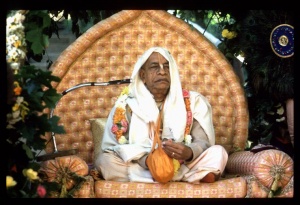CC Madhya 8.256: Difference between revisions
m (1 revision(s)) |
No edit summary |
||
| Line 1: | Line 1: | ||
{{ | [[Category:Sri Caitanya-caritamrta - Madhya-lila Chapter 08|C256]] | ||
<div style="float:left">'''[[Sri Caitanya-caritamrta|Śrī Caitanya-caritāmṛta]] - [[CC Madhya|Madhya-līlā]] - [[CC Madhya 8|Chapter 8: Talks Between Śrī Caitanya Mahāprabhu and Rāmānanda Rāya]]'''</div> | |||
<div style="float:right">[[File:Go-previous.png|link=CC Madhya 8.255|Madhya-līlā 8.255]] '''[[CC Madhya 8.255|Madhya-līlā 8.255]] - [[CC Madhya 8.257|Madhya-līlā 8.257]]''' [[File:Go-next.png|link=CC Madhya 8.257|Madhya-līlā 8.257]]</div> | |||
{{CompareVersions|CC|Madhya 8.256|CC 1975|CC 1996}} | |||
{{RandomImage}} | |||
==== TEXT 256 ==== | ==== TEXT 256 ==== | ||
<div | <div class="verse"> | ||
‘upāsyera madhye kon upāsya pradhāna?’ | :‘upāsyera madhye kon upāsya pradhāna?’ | ||
‘śreṣṭha upāsya—yugala ‘rādhā-kṛṣṇa’ nāma’ | :‘śreṣṭha upāsya—yugala ‘rādhā-kṛṣṇa’ nāma’ | ||
</div> | </div> | ||
| Line 12: | Line 16: | ||
==== SYNONYMS ==== | ==== SYNONYMS ==== | ||
<div | <div class="synonyms"> | ||
''upāsyera''—objects of worship; ''madhye''—among; ''kon''—which; ''upāsya''—worshipable object; ''pradhāna''—the chief; ''śreṣṭha''—the chief; ''upāsya''—worshipable object; ''yugala''—the couple; ''rādhā-kṛṣṇa nāma''—the holy name of Rādhā-Kṛṣṇa, or Hare Kṛṣṇa. | |||
</div> | </div> | ||
| Line 19: | Line 23: | ||
==== TRANSLATION ==== | ==== TRANSLATION ==== | ||
<div | <div class="translation"> | ||
Śrī Caitanya Mahāprabhu asked, “Among all worshipable objects, which is the chief?” | Śrī Caitanya Mahāprabhu asked, “Among all worshipable objects, which is the chief?” | ||
Rāmānanda Rāya replied, “The chief worshipable object is the holy name of Rādhā and Kṛṣṇa, the Hare Kṛṣṇa mantra.” | Rāmānanda Rāya replied, “The chief worshipable object is the holy name of Rādhā and Kṛṣṇa, the Hare Kṛṣṇa mantra.” | ||
| Line 27: | Line 31: | ||
==== PURPORT ==== | ==== PURPORT ==== | ||
<div | <div class="purport"> | ||
According to Śrīmad-Bhāgavatam ([[SB 6.3.22]]): | According to [[Srimad-Bhagavatam|''Śrīmad-Bhāgavatam'']] ([[SB 6.3.22]]): | ||
:etāvān eva loke ’smin puṁsāṁ dharmaḥ paraḥ smṛtaḥ | :''etāvān eva loke ’smin puṁsāṁ dharmaḥ paraḥ smṛtaḥ'' | ||
:bhakti-yogo bhagavati tan-nāma-grahaṇādibhiḥ | :''bhakti-yogo bhagavati tan-nāma-grahaṇādibhiḥ'' | ||
“In this material world the living entity’s only business is to accept the path of bhakti-yoga and chant the holy name of the Lord.” | “In this material world the living entity’s only business is to accept the path of ''bhakti-yoga'' and chant the holy name of the Lord.” | ||
</div> | </div> | ||
__NOTOC__ | |||
<div style="float:right; clear:both;">[[File:Go-previous.png|link=CC Madhya 8.255|Madhya-līlā 8.255]] '''[[CC Madhya 8.255|Madhya-līlā 8.255]] - [[CC Madhya 8.257|Madhya-līlā 8.257]]''' [[File:Go-next.png|link=CC Madhya 8.257|Madhya-līlā 8.257]]</div> | |||
__NOTOC__ | |||
__NOEDITSECTION__ | |||
Revision as of 10:19, 20 August 2021
Śrī Caitanya-caritāmṛta - Madhya-līlā - Chapter 8: Talks Between Śrī Caitanya Mahāprabhu and Rāmānanda Rāya

His Divine Grace
A.C. Bhaktivedanta Swami Prabhupada
A.C. Bhaktivedanta Swami Prabhupada
TEXT 256
- ‘upāsyera madhye kon upāsya pradhāna?’
- ‘śreṣṭha upāsya—yugala ‘rādhā-kṛṣṇa’ nāma’
SYNONYMS
upāsyera—objects of worship; madhye—among; kon—which; upāsya—worshipable object; pradhāna—the chief; śreṣṭha—the chief; upāsya—worshipable object; yugala—the couple; rādhā-kṛṣṇa nāma—the holy name of Rādhā-Kṛṣṇa, or Hare Kṛṣṇa.
TRANSLATION
Śrī Caitanya Mahāprabhu asked, “Among all worshipable objects, which is the chief?” Rāmānanda Rāya replied, “The chief worshipable object is the holy name of Rādhā and Kṛṣṇa, the Hare Kṛṣṇa mantra.”
PURPORT
According to Śrīmad-Bhāgavatam (SB 6.3.22):
- etāvān eva loke ’smin puṁsāṁ dharmaḥ paraḥ smṛtaḥ
- bhakti-yogo bhagavati tan-nāma-grahaṇādibhiḥ
“In this material world the living entity’s only business is to accept the path of bhakti-yoga and chant the holy name of the Lord.”